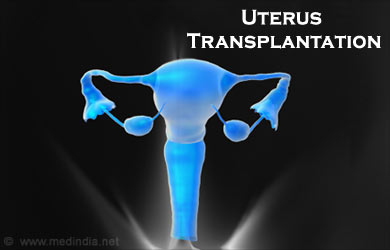Uterus Transplantation: A Pathway To Pregnancy For Transgender Women?

Table of Contents
The Science of Uterus Transplantation
Uterus transplantation, also known as uterine transplant, is a complex surgical procedure involving the removal of a uterus from a deceased or living donor and its subsequent transplantation into a recipient. The surgery is highly specialized, requiring a multidisciplinary team of surgeons, immunologists, and reproductive specialists.
Success rates for uterus transplantation, while improving, remain relatively low compared to other organ transplants. Challenges include the intricate surgical techniques required, the risk of rejection due to the body's immune response, and the need for lifelong immunosuppressant medication. These medications, while vital to preventing rejection, can have significant side effects, including increased susceptibility to infections and other health complications.
- Surgical complexities: The delicate nature of the uterus and its intricate connections to other organs necessitate highly skilled surgeons and meticulous surgical planning.
- Donor selection criteria: Rigorous screening processes are vital to ensure the donor uterus is healthy and suitable for transplantation.
- Recipient selection criteria: Candidates for uterus transplantation must meet strict health criteria to minimize risks and maximize the chances of a successful outcome. This includes thorough psychological evaluations.
- Immunosuppression protocols: Recipients require lifelong immunosuppressant drugs to prevent rejection of the transplanted uterus. Careful monitoring is essential to manage side effects.
- Post-transplant complications: Potential complications include infection, rejection, bleeding, and thromboembolic events.
Ethical and Social Considerations
Uterus transplantation for transgender women presents a number of significant ethical and social considerations. The most pressing is informed consent: ensuring that potential recipients fully understand the risks, benefits, and long-term implications of the procedure. Access to healthcare is another major issue, as the procedure is expensive and requires specialized medical facilities.
Furthermore, societal perceptions and potential biases regarding transgender pregnancy can significantly impact the emotional well-being of transgender women considering this option. Addressing social stigma and ensuring inclusive healthcare environments are crucial to support transgender women throughout their reproductive journey.
- Informed consent: Comprehensive counseling and support are vital to ensure transgender women make informed decisions about uterus transplantation.
- Access to healthcare: Financial constraints and limited availability of specialized facilities can restrict access to this procedure.
- Social stigma: Negative societal attitudes and discrimination can create significant emotional and psychological challenges.
- Long-term psychological impact: The emotional journey of undergoing uterus transplantation and attempting pregnancy can be intense, necessitating ongoing psychological support.
- Financial burdens: The high cost of the procedure, including surgery, medication, and follow-up care, can create substantial financial burdens.
Current Research and Future Prospects
Research on uterus transplantation is ongoing, although data specifically on transgender women recipients is limited. Current research focuses on improving surgical techniques, developing more effective immunosuppressant drugs with fewer side effects, and optimizing post-transplant care protocols. Future advancements may include the development of artificial uteri, though this technology is still in its early stages. Increased collaboration between medical professionals and transgender communities is vital for designing inclusive research protocols and ensuring the needs and perspectives of transgender women are central to this field's development.
- Clinical trials and data: Larger-scale clinical trials are needed to gather robust data on the efficacy and safety of uterus transplantation in transgender women.
- Technological advancements: Improved immunosuppression techniques and refined surgical methods hold significant potential for increasing success rates.
- Funding and resource allocation: Adequate funding is crucial for supporting research, clinical trials, and the development of better treatment strategies.
- Future research directions: Focusing on the unique needs of transgender women is paramount, including addressing psychological and social aspects.
- Collaboration between medical professionals and transgender communities: Engaging transgender individuals throughout the research process is critical for ethical and effective outcomes.
Access to Care and Healthcare Policies
Accessibility of uterus transplantation for transgender women is significantly impacted by financial barriers and healthcare policies. Insurance coverage for this complex procedure is often limited or non-existent, creating a major obstacle for many transgender women who may wish to pursue this option. Government regulations and policies regarding reproductive healthcare also play a significant role in determining access.
- Financial barriers: The substantial cost of uterus transplantation makes it inaccessible to many transgender women.
- Insurance coverage limitations: Many insurance providers do not cover the procedure, leading to significant out-of-pocket expenses.
- Government regulations and policies: Healthcare policies can either facilitate or hinder access to this type of advanced reproductive technology.
- Advocacy groups and support systems: These groups play a vital role in advocating for policy changes and providing essential support to transgender women.
Conclusion: Uterus Transplantation and the Future of Transgender Reproductive Rights
Uterus transplantation presents both exciting possibilities and complex ethical challenges for transgender women seeking pregnancy. While the procedure offers a potential pathway to parenthood, it's crucial to acknowledge the significant scientific, ethical, and access-related hurdles. Ongoing research, ethical dialogue, and commitment to equitable access to healthcare are paramount to ensure that this innovative reproductive technology benefits transgender women in a safe, ethical, and equitable manner. Learn more about the advancements in uterus transplantation and join the conversation to ensure equitable access to this life-changing procedure for transgender women.

Featured Posts
-
 Elizabeth Hurley Baring It All Her Most Unforgettable Cleavage Moments
May 10, 2025
Elizabeth Hurley Baring It All Her Most Unforgettable Cleavage Moments
May 10, 2025 -
 Pakistan Sri Lanka Bangladesh A New Era Of Capital Market Cooperation
May 10, 2025
Pakistan Sri Lanka Bangladesh A New Era Of Capital Market Cooperation
May 10, 2025 -
 7 Year Absence Ends Familiar Faces Reunite In High Potential Finale
May 10, 2025
7 Year Absence Ends Familiar Faces Reunite In High Potential Finale
May 10, 2025 -
 Luxury Car Sales In China A Look At The Challenges Faced By Bmw Porsche And Others
May 10, 2025
Luxury Car Sales In China A Look At The Challenges Faced By Bmw Porsche And Others
May 10, 2025 -
 Antipremiya Zolotaya Malina Provaly Goda S Uchastiem Dakoty Dzhonson
May 10, 2025
Antipremiya Zolotaya Malina Provaly Goda S Uchastiem Dakoty Dzhonson
May 10, 2025
